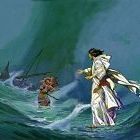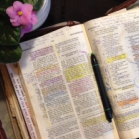Leaderboard
Popular Content
Showing content with the highest reputation on 04/19/2019 in all areas
-
The Sacrifice, The Highest Price (A Prayer To The Lamb Of God) Oh Lamb of God, so perfect Who deserved man's adoration Instead you received mockery And cruel degradation They stripped You of all clothing They whipped You violently They put You on a splintered cross To die for such as me I marvel at Your anguish Your beyond words agony I'm grateful for Your Blood that flowed Upon that wretched tree Without it, there would be no hope No way I could atone The sacrifice, the highest price Was paid by You alone3 points
-
Jeremiah 31:3 (KJV) ~~~~~~~~~~~~~~~~~~~Yea, I have loved thee with an everlasting love: therefore with lovingkindness have I drawn thee. This is God’s desire and heart towards mankind, it is with this love He draws mankind. This eternal, everlasting love. The goodness of a love that is beyond measure, a love that is goodness itself. A love that is pureness itself. A love that is pure righteousness. A love that is free from all disorder, free from every form of selfishness or any evil thing. It is everlasting purity itself. An everlasting love that has no beginning or end. This is the great and awesome love that was given in Christ when Christ was given to mankind. Today His love shines on all, searching and seeking a heart it may enter, all the day long it knocks and asks to be allowed to enter. Looking for a heart that would be willing to give up all it’s own self, all it’s own love, that it might be able to love with the love of God. This love God freely gives to all that would ask. Can easily be accessed at any moment of time by the faith of the heart of the believer, regardless of the state or condition of the heart. A simple turning of the faith of the heart to God is all that is required, and a willingness to believe in the love of God. This is God’s work of wonder. It heals all, it fixes all, it forgives all, it is for all that would be willing to accept this love on loves own terms. This love of God toward mankind is the all of God. It is His gift of Himself to mankind. For as long as today is called today His love shines to bring forth the fruit of love. Oh to love with the love of God, though it will cost us all, all we lay claim to as our own. This love is God’s heart toward mankind, that mankind would love each other with this love of God. It is such a wondrous, a glorious love, the heart breaks and melts at the prospect of being loved by this love and being able to love with this love. For there can be no higher gift to receive or give than to love with the love of God. Oh to walk in perfect righteousness is to walk in perfect love. To walk in perfect love is to walk in perfect righteousness. Oh what a wonder is God’s gift of love that was revealed in Christ Jesus. Nothing can prevent us from receiving the love of God in Christ Jesus, except our unwillingness to receive it. Blessing to all that would be willing to give up all their hopes, dreams, desires to receive such great a gift that they can be conduits, of the love of God to all. Much love in Christ, Not me3 points
-
A Physician's View of the Crucifixion of Jesus Christ Related Content Find Power in your inbox with God's Word Related Topics Jesus Pain and Suffering Death Easter Dr. C. Truman Davis Share Tweet Email + WARNING: MATERIAL IN THIS ARTICLE MAY BE UNSUITABLE FOR YOUNGER CHILDREN. PARENTAL DISCRETION IS ADVISED. About a decade ago, reading Jim Bishop’s The Day Christ Died, I realized that I had for years taken the Crucifixion more or less for granted — that I had grown callous to its horror by a too easy familiarity with the grim details and a too distant friendship with our Lord. It finally occurred to me that, though a physician, I didn’t even know the actual immediate cause of death. The Gospel writers don’t help us much on this point, because crucifixion and scourging were so common during their lifetime that they apparently considered a detailed description unnecessary. So we have only the concise words of the Evangelists: “Pilate, having scourged Jesus, delivered Him to them to be crucified — and they crucified Him.” I have no competence to discuss the infinite psychic and spiritual suffering of the Incarnate God atoning for the sins of fallen man. But it seemed to me that as a physician I might pursue the physiological and anatomical aspects of our Lord’s passion in some detail. What did the body of Jesus of Nazareth actually endure during those hours of torture? This led me first to a study of the practice of crucifixion itself; that is, torture and execution by fixation to a cross. I am indebted to many who have studied this subject in the past, and especially to a contemporary colleague, Dr. Pierre Barbet, a French surgeon who has done exhaustive historical and experimental research and has written extensively on the subject. Apparently, the first known practice of crucifixion was by the Persians. Alexander and his generals brought it back to the Mediterranean world — to Egypt and to Carthage. The Romans apparently learned the practice from the Carthaginians and (as with almost everything the Romans did) rapidly developed a very high degree of efficiency and skill at it. A number of Roman authors (Livy, Cicer, Tacitus) comment on crucifixion, and several innovations, modifications, and variations are described in the ancient literature. For instance, the upright portion of the cross (or stipes) could have the cross-arm (or patibulum) attached two or three feet below its top in what we commonly think of as the Latin cross. The most common form used in our Lord’s day, however, was the Tau cross, shaped like our T. In this cross, the patibulum was placed in a notch at the top of the stipes. There is archeological evidence that it was on this type of cross that Jesus was crucified. Without any historical or biblical proof, Medieval and Renaissance painters have given us our picture of Christ carrying the entire cross. But the upright post, or stipes, was generally fixed permanently in the ground at the site of execution and the condemned man was forced to carry the patibulum, weighing about 110 pounds, from the prison to the place of execution. Many of the painters and most of the sculptors of crucifixion, also show the nails through the palms. Historical Roman accounts and experimental work have established that the nails were driven between the small bones of the wrists (radial and ulna) and not through the palms. Nails driven through the palms will strip out between the fingers when made to support the weight of the human body. The misconception may have come about through a misunderstanding of Jesus’ words to Thomas, “Observe my hands.” Anatomists, both modern and ancient, have always considered the wrist as part of the hand. A titulus, or small sign, stating the victim’s crime was usually placed on a staff, carried at the front of the procession from the prison, and later nailed to the cross so that it extended above the head. This sign with its staff nailed to the top of the cross would have given it somewhat the characteristic form of the Latin cross. But, of course, the physical passion of the Christ began in Gethsemane. Of the many aspects of this initial suffering, the one of greatest physiological interest is the bloody sweat. It is interesting that St. Luke, the physician, is the only one to mention this. He says, “And being in agony, He prayed the longer. And His sweat became as drops of blood, trickling down upon the ground.” Every ruse (trick) imaginable has been used by modern scholars to explain away this description, apparently under the mistaken impression that this just doesn’t happen. A great deal of effort could have been saved had the doubters consulted the medical literature. Though very rare, the phenomenon of Hematidrosis, or bloody sweat, is well documented. Under great emotional stress of the kind our Lord suffered, tiny capillaries in the sweat glands can break, thus mixing blood with sweat. This process might well have produced marked weakness and possible shock. After the arrest in the middle of the night, Jesus was next brought before the Sanhedrin and Caiphus, the High Priest; it is here that the first physical trauma was inflicted. A soldier struck Jesus across the face for remaining silent when questioned by Caiphus. The palace guards then blind-folded Him and mockingly taunted Him to identify them as they each passed by, spat upon Him, and struck Him in the face. In the early morning, battered and bruised, dehydrated, and exhausted from a sleepless night, Jesus is taken across the Praetorium of the Fortress Antonia, the seat of government of the Procurator of Judea, Pontius Pilate. You are, of course, familiar with Pilate’s action in attempting to pass responsibility to Herod Antipas, the Tetrarch of Judea. Jesus apparently suffered no physical mistreatment at the hands of Herod and was returned to Pilate. It was then, in response to the cries of the mob, that Pilate ordered Bar-Abbas released and condemned Jesus to scourging and crucifixion. There is much disagreement among authorities about the unusual scourging as a prelude to crucifixion. Most Roman writers from this period do not associate the two. Many scholars believe that Pilate originally ordered Jesus scourged as his full punishment and that the death sentence by crucifixion came only in response to the taunt by the mob that the Procurator was not properly defending Caesar against this pretender who allegedly claimed to be the King of the Jews. Preparations for the scourging were carried out when the Prisoner was stripped of His clothing and His hands tied to a post above His head. It is doubtful the Romans would have made any attempt to follow the Jewish law in this matter, but the Jews had an ancient law prohibiting more than forty lashes. The Roman legionnaire steps forward with the flagrum (or flagellum) in his hand. This is a short whip consisting of several heavy, leather thongs with two small balls of lead attached near the ends of each. The heavy whip is brought down with full force again and again across Jesus’ shoulders, back, and legs. At first the thongs cut through the skin only. Then, as the blows continue, they cut deeper into the subcutaneous tissues, producing first an oozing of blood from the capillaries and veins of the skin, and finally spurting arterial bleeding from vessels in the underlying muscles. The small balls of lead first produce large, deep bruises which are broken open by subsequent blows. Finally the skin of the back is hanging in long ribbons and the entire area is an unrecognizable mass of torn, bleeding tissue. When it is determined by the centurion in charge that the prisoner is near death, the beating is finally stopped. The half-fainting Jesus is then untied and allowed to slump to the stone pavement, wet with His own blood. The Roman soldiers see a great joke in this provincial Jew claiming to be king. They throw a robe across His shoulders and place a stick in His hand for a scepter. They still need a crown to make their travesty complete. Flexible branches covered with long thorns (commonly used in bundles for firewood) are plaited into the shape of a crown and this is pressed into His scalp. Again there is copious bleeding, the scalp being one of the most vascular areas of the body. After mocking Him and striking Him across the face, the soldiers take the stick from His hand and strike Him across the head, driving the thorns deeper into His scalp. Finally, they tire of their sadistic sport and the robe is torn from His back. Already having adhered to the clots of blood and serum in the wounds, its removal causes excruciating pain just as in the careless removal of a surgical bandage, and almost as though He were again being whipped the wounds once more begin to bleed. In deference to Jewish custom, the Romans return His garments. The heavy patibulum of the cross is tied across His shoulders, and the procession of the condemned Christ, two thieves, and the execution detail of Roman soldiers headed by a centurion begins its slow journey along the Via Dolorosa. In spite of His efforts to walk erect, the weight of the heavy wooden beam, together with the shock produced by copious blood loss, is too much. He stumbles and falls. The rough wood of the beam gouges into the lacerated skin and muscles of the shoulders. He tries to rise, but human muscles have been pushed beyond their endurance. The centurion, anxious to get on with the crucifixion, selects a stalwart North African onlooker, Simon of Cyrene, to carry the cross. Jesus follows, still bleeding and sweating the cold, clammy sweat of shock, until the 650 yard journey from the fortress Antonia to Golgotha is finally completed. Jesus is offered wine mixed with myrrh, a mild analgesic mixture. He refuses to drink. Simon is ordered to place the patibulum on the ground and Jesus quickly thrown backward with His shoulders against the wood. The legionnaire feels for the depression at the front of the wrist. He drives a heavy, square, wrought-iron nail through the wrist and deep into the wood. Quickly, he moves to the other side and repeats the action, being careful not to pull the arms too tightly, but to allow some flexion and movement. The patibulum is then lifted in place at the top of the stipes and the titulus reading, “Jesus of Nazareth, King of the Jews,” is nailed in place. The left foot is now pressed backward against the right foot, and with both feet extended, toes down, a nail is driven through the arch of each, leaving the knees moderately flexed. The Victim is now crucified. As He slowly sags down with more weight on the nails in the wrists, excruciating pain shoots along the fingers and up the arms to explode in the brain — the nails in the wrists are putting pressure on the median nerves. As He pushes Himself upward to avoid this stretching torment, He places His full weight on the nail through His feet. Again there is the searing agony of the nail tearing through the nerves between the metatarsal bones of the feet. At this point, as the arms fatigue, great waves of cramps sweep over the muscles, knotting them in deep, relentless, throbbing pain. With these cramps comes the inability to push Himself upward. Hanging by his arms, the pectoral muscles are paralyzed and the intercostal muscles are unable to act. Air can be drawn into the lungs, but cannot be exhaled. Jesus fights to raise Himself in order to get even one short breath. Finally, carbon dioxide builds up in the lungs and in the blood stream and the cramps partially subside. Spasmodically, he is able to push Himself upward to exhale and bring in the life-giving oxygen. It was undoubtedly during these periods that He uttered the seven short sentences recorded: The first, looking down at the Roman soldiers throwing dice for His seamless garment, “Father, forgive them for they know not what they do.” The second, to the penitent thief, “Today thou shalt be with me in Paradise.” The third, looking down at the terrified, grief-stricken adolescent John — the beloved Apostle — he said, “Behold thy mother.” Then, looking to His mother Mary, “Woman behold thy son.” The fourth cry is from the beginning of the 22nd Psalm, “My God, my God, why has thou forsaken me?” Jesus experienced hours of limitless pain, cycles of twisting, joint-rending cramps, intermittent partial asphyxiation, searing pain where tissue is torn from His lacerated back as He moves up and down against the rough timber. Then another agony begins -- a terrible crushing pain deep in the chest as the pericardium slowly fills with serum and begins to compress the heart. One remembers again the 22nd Psalm, the 14th verse: “I am poured out like water, and all my bones are out of joint; my heart is like wax; it is melted in the midst of my bowels.” It is now almost over. The loss of tissue fluids has reached a critical level; the compressed heart is struggling to pump heavy, thick, sluggish blood into the tissue; the tortured lungs are making a frantic effort to gasp in small gulps of air. The markedly dehydrated tissues send their flood of stimuli to the brain. Jesus gasps His fifth cry, “I thirst.” One remembers another verse from the prophetic 22nd Psalm: “My strength is dried up like a potsherd; and my tongue cleaveth to my jaws; and thou has brought me into the dust of death.” A sponge soaked in posca, the cheap, sour wine which is the staple drink of the Roman legionaries, is lifted to His lips. He apparently doesn’t take any of the liquid. The body of Jesus is now in extremes, and He can feel the chill of death creeping through His tissues. This realization brings out His sixth words, possibly little more than a tortured whisper, “It is finished.” His mission of atonement has completed. Finally He can allow his body to die. With one last surge of strength, he once again presses His torn feet against the nail, straightens His legs, takes a deeper breath, and utters His seventh and last cry, “Father! Into thy hands I commit my spirit.” The rest you know. In order that the Sabbath not be profaned, the Jews asked that the condemned men be dispatched and removed from the crosses. The common method of ending a crucifixion was by crurifracture, the breaking of the bones of the legs. This prevented the victim from pushing himself upward; thus the tension could not be relieved from the muscles of the chest and rapid suffocation occurred. The legs of the two thieves were broken, but when the soldiers came to Jesus they saw that this was unnecessary. Apparently, to make doubly sure of death, the legionnaire drove his lance through the fifth interspace between the ribs, upward through the pericardium and into the heart. The 34th verse of the 19th chapter of the Gospel according to St. John reports: “And immediately there came out blood and water.” That is, there was an escape of water fluid from the sac surrounding the heart, giving postmortem evidence that Our Lord died not the usual crucifixion death by suffocation, but of heart failure (a broken heart) due to shock and constriction of the heart by fluid in the pericardium. Thus we have had our glimpse — including the medical evidence — of that epitome of evil which man has exhibited toward Man and toward God. It has been a terrible sight, and more than enough to leave us despondent and depressed. How grateful we can be that we have the great sequel in the infinite mercy of God toward man — at once the miracle of the atonement (at one ment) and the expectation of the triumphant Easter morning. Are you moved by what Jesus did for you on the cross?3 points
-
Some ministries live off the profits from books and take nothing from their pastoral or evangelical ministries. Some of those ask for a free will offering for their books and don't charge per se, so that those who cannot pay may receive them. I think it is OK to charge for them to cover costs and a slight profit. My grandson pays $600.00 for a text book for college. They don't charge anything but a nominal fee for Christian books and Bibles.3 points
-
Hi Not me, That is so encouraging and uplifting. I really appreciated reading that and meditating upon it. Thanks, Marilyn.3 points
-
Just in time for Pesach (Passover), my daughter Elianna surprised us by putting together this lyric video, of a song my wife recorded on the fly with friends some years ago, thinking she'd never use it. Check out this fun bluesy version of Go Down Moses sung by Baht Rivka Whitten.2 points
-
The only thing you didn't expand on was that it was the whole company of the guard. This was either a centuriae or a sub unit vexilation. Imagine a platoon of professional soldiers allowed to 'play' with a prisoner already condemned to death and add in the ritual of humiliating thatprisoner and Isaiah report of him having no lovelyness starts to make sense. A detachment of roman solders amused themselfs punching their victem, of beating him on the head. He would not have been recognisable as human once they finished. Despite all he suffered physicaly the worse was the pollution of our sin and the Father turning his face away. We will never know how much this cost Jesus.2 points
-
Some christians do not take much money for their christian books. I believe C.S. Lewis donated 3/4 or more to charities. He did not want his name attached to the gifts distributed. I am thankful for the christian books I have. People do have to make a living.2 points
-
Yet the labourer is worthy of his hire and when thrashing they were forbidden to mussle the cow treading out the grain. How many hours of study is represented in a sermon you've listened to, or in a Christian book/blo you've read. If you have freely recieved from those hours of study, are you prepared to donate that amount of hourly pay to charity? Not all minister are multily millionaires, many are poorly paid and make extra income through writing. The hristian writers I know, not many, don't make much out of publishing and freely give books to missions that can use them. Here is a suggestion. Have a table put out in your church and announce that the congragtion can put unwanted Christian books on the table. People can take books from the table and make a cash donation. After a set period send the cash to a mission organisation and the books once sorted to missions that can use them, any that can't be forwarded recycle.2 points
-
Some writers use the proceeds to fund missions of the ministry they are partnered with and never touch a profit so to speak. But publishers need to run a business and paper isn't free or the rent in the stores who sell the books. Many people volunteer in editing and proofreading. Writing is very laborious especially to those who are called as teachers and pastors. Engaging with people is where their hearts are not cut off in a room. It's why books can take years to finish and many times not at all. I think holding back teaching CDs or printed material because a person is unable to afford them is wrong. Those of us who have the means to purchase should because solid ministries give freely. Those who purchase and give extra to a ministry help supply teaching materials, Bibles and books to those that are less fortunate. So some ministries have built on the concept of freely receive freely give but rent, food, travel, publishing, isn't free. If music, books, teaching CDs are part of a "Christian Industry" instead of a Christian Ministry then I agree in part with you, don't buy them. But usually good teaching, good books are a part of good ministry. I went last minute to a midweek study years ago and had forgotten my wallet in the rush. The speaker was profound so I went to the table their ministry had set up looking over the tapes and grabbing information when the man running the table asked what subject matter I was into at the moment and I said I was in such a hurry to get out of the house I forgot my wallet and he smiled and said "Freely receive, freely give. Take what you want." I still give to that ministry at times and it's been a few decades now. They have an aids orphanage in South Africa, plant churches, help the poor and supply schools for their children in a number of countries. It's not a huge ministry and mostly small communities but except for the orphanage leader, school teachers and a few missionaries, no one else receives any salaries, the administrators in any country or the head of the ministry itself do not receive pay. Travel costs are covered but most everyone makes tents so to speak. All book and tape proceeds go into these diverse ministries and the production of more materials. So ya in a perfect world everything is free, but this is not a perfect world. People need to work and people need money. Nothing wrong with money, just our attitude toward it. Fallen man is the problem. What's important is the content of the book and what ministry is the writer attached to? Discernment. At this point, I will not spend a dime on NT Wright material. I've listened to hours on the web and read a book given to me written by him but will not lend any help in that direction. I'll read his material and listen for discernment purposes only if it is free. The Lord's money needs to go to real ministry. Not some hierarchical gibber jab of intellectual hogwash ecumenism whitewashed sepulchre oxford accented politically motivated speech. But that's just me. We all have choices to make.2 points
-
@Neighbor Excellent! I will make sure to do that. I have a friend coming over today. We were wondering what to watch tonight from a Messianic perspective. This is our answer to prayer. Thanks, neighbor.2 points
-
Yes. Might you enjoy viewing Zola Levitt's presentation- it is a You Tube video " The Miracle Of Passover (2012), #1and part 2 Zola Levitt Presents I have posted them for approval under Christian Videos It is the night of great sacrifice and salvation.2 points
-
Yep Yep ... but from a Messianic Jewish perspective ... i have researched the Seder Meal and our church is having their Seder Meal tonight.2 points
-
2 points
-
A more excellent way, that reminded me of.... After speaking of the many spiritual gifts possible to believers, Paul wrote "and yet I show unto you a more excellent way." 1 Corinthians 12:31. Then Paul continues with the famous love chapter, 1 Corinthians 13....the more excellent way. We must always consider and allow these words about what love truly is to flow outward to others. We can say or teach everything spiritual, but it means nothing without having the love of God for others.2 points
-
Hi tt, So appropriate. Did you just get this at Easter time? Hope you can have time with a friend &/or family at this time. all the best, Marilyn.2 points
-
Hi heavensflower, Thank you for sharing and glad you have come to Worthy. You have such a caring heart, sister, to want to share of God`s love, and you can do that right here on these forums. And actually you are doing it right now just by saying about Jesus and His great love for us. You are in the Body of Christ, and as such the Lord works through you too, giving us here encouragement to look to Jesus. Now often we can look at our lives and what we don`t have. May I suggest you write down all the things you do have and tell the enemy who tries to put you down in your mind that what he is saying is untrue. You are much needed on Worthy, and wherever you are, at home at art class, for your life shows that you do not belong to this negative speaking world, but you belong to Jesus. Keep filling your heart and mind with His words and they will come out here and elsewhere too. Lovely to meet you, as you sound a very lovely person. All the best and hope to chat soon. Marilyn.2 points
-
Shalom, Willa. Actually, you have the Greek words reversed. It was "petros" that was a little stone, but "petra" was the bedrock! The key word that Yeshua` named Peter was "cephas" which was an Anglicized/Hellenized version of the Hebrew word "keefa." The word DOES mean a "stone," but it means a "HOLLOW stone." He was being called and likened to a GEODE, plain on the outside but beautiful crystals on the inside! John 1:42 (KJV) 42 And he brought him to Jesus. And when Jesus beheld him, he said, Thou art Simon the son of Jona: thou shalt be called Cephas (Greek: kefas), which is by interpretation, A stone (Greek: petros). From Strong's Dictionary of the Greek Language, we read, 2786 keefas (kay-fas'). Of Chaldee origin (compare keef); the Rock; Cephas (i.e. Kepha), a surname of Peter -- Cephas. And, in its Dictionary of the Hebrew and Chaldee Language, we read, 3710 keef (kafe). From kaafaf; a hollow rock -- rock. 3721 kaafaf (kaw-faf'). A primitive root; to curve -- bow down (self). A geode is usually filled with semi-precious gems, like amethyst, but it is certainly NOT something one could build upon! The "Petra" was Kefa's CONFESSION in Yeshua` being both the Maashiyach and the Son of the Living God. THAT was "bedrock!" Then, we read later in Matthew: Matthew 16:13-20 (KJV) 13 When Jesus came into the coasts of Caesarea Philippi, he asked his disciples, saying, "Whom do men say that I the Son of man am?" 14 And they said, "Some say that thou art John the Baptist: some, Elias; and others, Jeremias, or one of the prophets." 15 He saith unto them, "But whom say ye that I am? 16 And Simon Peter answered and said, "Thou art the Christ (Greek: ho Christos = Hebrew: haMashiyach = "the Anointed One"), the Son of the living God." 17 And Jesus answered and said unto him, "Blessed art thou, Simon Barjona: for flesh and blood hath not revealed it unto thee, but my Father which is in heaven. 18 And I say also unto thee, That thou art Peter (Greek: Petros), and upon this rock (Greek: petra) I will build my church; and the gates of hell shall not prevail against it. 19 And I will give unto thee the keys of the kingdom of heaven: and whatsoever thou shalt bind on earth shall be bound in heaven: and whatsoever thou shalt loose on earth shall be loosed in heaven." 20 Then charged he his disciples that they should tell no man that he was Jesus the Christ (Yeshua` haMashiyach or Yeshua` the Messiah). Read below my signature for info on the CAPSTONE.2 points
-
I feel lonely because i stay at home often and I have not been to church in years. I cannot drive a motor vehicle, i don't have a job, but i go to art class one day a week. I live with my parents and they are retired. I help them out at home, clean up the house. I pray and read the Bible, I try to do this every day. I hate the usually unchristian TV shows, there is so much sin in the world, I wish I could avoid it. I have a large movie dvd collection. I see a psychiatrist and counselor. i was raised in a southern baptist Christian family. My parents are disapointed in right wing republican politics. I talk to my parents. I am not normal, but the Lord gave me other talents to make up for what I do not have. I want to tell others about God's love and mercy, how much Christ loves us to die on the cross, He taught us how to live and healed people. Jesus healed me of my broken heart and helped me to forgive people who hurt my feelings and made fun of me, he taught me about love.2 points
-
Some people as my self adapt to loneliness because their faith is built upon a rock. Not all can endure loneliness but there is only one who is my strength and friend for ever. I do go through times I'm troubled but My Lord picks me up so we can walk together. Yes I shake hands remember names but I am a quiet type. the danger in churches we go to today is tradition. This is why I am not a member. We should be the church everyday spending time in prayer and devotion. " No ye not that ye are the Temple of God and His spirit dwells with in." My favorite verse is from "AS the Deer Panteth " He's my friend and he is my Brother even though you are a King I love you more than any other. We need to understand the we are not the church so much congregationally. I am the church where ever I go. I do have family not far. but they are on the go all the time. I look at my wife's picture everyday and her smile comforts me. She and Jesus are waiting. If I could only go today. How do I know that Jesus talks to me all the time. You would not believe it. Be Bless.2 points
-
Hi Michael, I`m glad you can distinguish between what man organises and what is an organism by the Holy Spirit - the Body of Christ. When the public meeting takes over the role of the Head of the Body and organises the believer`s spiritual life, then we get unnatural groupings. The Head of the Body however, works through His Holy Spirit bringing people together in a mentoring relationship. We see this in God`s word, and how effective that is, for a more mature one comes along side a younger one in the Lord and helps them to hear the Lord in their daily life. This involves walking with others in their daily lives and not just a smile & hand shake or cuppa after the meeting. Marilyn.2 points
-
In his koine Greek, Paul said "Pascha" - Passover - was sacrificed. What part of Passover was sacrificed, RW? The egg? The bitter herbs? No, the Lamb. The King James, ESV, NIV, Berean, NLT, and many more translate this as Passover Lamb as Jesus being called the Lamb all over the New Testament makes this understood that Paul is referring to Jesus as the Passover Lamb. Jesus Christ, the Lamb of God, slain from the foundation of the world. And yes, Jesus described his body as bread.2 points
-
As soldiers for Christ, we need to recognize the real enemy, the ones who blinded their minds, seeking whom they can destroy. Ephesians 6:12 For we wrestle not against flesh and blood, but against principalities, against powers, against the rulers of the darkness of this world, against spiritual wickedness in high places. 2 Corinthians 4:3-4 But if our gospel be hid, it is hid to them that are lost: In whom the god of this world hath blinded the minds of them which believe not, lest the light of the glorious gospel of Christ, who is the image of God, should shine unto them. "How, then, can they call on the one they have not believed in? And how can they believe in the one of whom they have not heard? And how can they hear without someone preaching to them? And how can they preach unless they are sent? As it is written, "How beautiful are the feet of those who bring good news!" (Romans 10:14-15)2 points
-
There was a purpose in the miracles of Jesus. It was to give credibility to who he was and what he was saying. When Jesus told Nicodemus the famous "For God so loved the world that he gave his only son.....", the only reason Nicodemus had come to him was because of the signs, or miracles, that Jesus performed. Nicodemus said so. The gospels assert in many places that this is why many people believed Jesus. Even with the Old Testament prophets like Elijah and Elisha and even with Moses, the revelation of what God is doing and saying via those men were given proof of validity. Today, we have the word of God. Miraculous in preservation in itself. There still are miracles, but our source of the evidence that God is who he says he is - well, it's God's word. Even if God parted the skies and appeared and said, "It's Me! Do what I say!", you would have millions of people turn away and rebel. Just like many, many people saw Jesus perform miracles and scorn him, ridicule him, and eventually kill him.2 points
-
Mornin' Folks, So last night I was in chat and the topic of atheists came up. I was surprised by the number of people that stated that they "hated" them some stating they "had no souls". Atheists are folks with hardened hearts, eyes that do not see and ears that do not hear. Basically they are folks who have not been sent the Holy Spirit and and brought into the light by our Lord. We, as believers, are disciples of God and it is our mission to help bring the word to people like these. So, I say we should not turn our faces away from atheists, but stand our ground and share the Lord's word with them. Be vigilant After all we are soldiers of God! Your thoughts? JJ1 point
-
Thank you so much TT, and as Marilyn has said, very appropriate, God bless.1 point
-
1 point
-
I would definitely do the wheat chex and trail mix but the juice goes in a separate container!! coffee on cereal, yes. Juice, no. ptooey. yuck. I did pull a weed out of my driveway and chop it into my cereal once or twice... it was .... oh man what was it called... supposedly a superfood... it tasted fine. I usually keep water soaked chia seeds in the fridge and scoop a blob of those onto my cereal too.1 point
-
1 point
-
because there is not a hello & goodbye thread in here i'm going to be takeing a break from these forums, I will not be posting until the fall, but I will post responses to topics that other people have written, my struggles are getting worse & I feel that I need to concentrate on my relationship with Jesus, God bless you all & Happy Easter1 point
-
Hi shortangel, Praying for you as you draw closer to the Lord and `let go` of all the burdens and struggles that are heavy upon you. How special it is when the Lord draws us out of the hustle and bustle and has us spend quiet times with Him. May you find new strength of spirit and quiet confidence in the Lord who loves us and is changing us. (Painful process, but oh, so rewarding.) all the best, Marilyn.1 point
-
Hi douge, I realise what you are saying however people are thinking you mean something different. They think that you are saying that there is different gospel, and this is the one that Paul told us to not accept. (2 Cor. 11: 4) I know you are not saying that, but to others it comes over that way. Thus, I think you would get more understanding if you focussed on what you said above and not say 2 gospels, which comes over not how you intended. regards, Marilyn.1 point
-
Exactly. Thankyou OrangeCat. The connotation that something is "the church's fault" suggests the false man-made clergy/laity structure rather than the Spirit-led biblical ministry of all believers. I like that line in the song, "What A Friend We Have In Jesus" that says "... Are there trials and temptations, Is there trouble anywhere, We should never be discouraged, Take it to the Lord in prayer."1 point
-
Hello The foundation of the twelve is found in the gospel of God which Paul preached. The gospel of God is the progressive revelation of the gospel found starting in the prophecy and promise in Genesis.1 point
-
Sonshine, you are going to make me bribe YOU. How could you ask such a thing! Now that you have been severely reprimanded.... what do you want? As far as the white banana, white mayonnaise and white bread..... eat it in the dark.1 point
-
It would not be a denomination.A true Christian will be joyful and at peace .He will be the one to keep his cool when things are going nuts.Who would not want to be like that? Plus.....he knows where he is going when he dies.Whats not to love?1 point
-
I have been emotionally drained from school. I am being bullied so much, that I kinda want to drop out and give up. What do I do?1 point
-
Perhaps you're referring to 1 Timothy 2:12 where the Apostle Paul says woman should not teach but keep silent? This is often taken out of context, and made for some difficulties for them in some churches. It simply means that women shouldn't take authority of that over a man. Of course they have a place in the body of Christ, and can indeed teach. Women such as Phoebe in Romans 16:1 served as basically a deaconess, So they are important. I hope this is a help to your question. God bless! Shalom, David/BeauJangles1 point
-
The gospel is this - Jesus died for our sins, was buried, and rose from the dead. And these things were foretold. I didn't make that up - God said that. 1 Corinthians 15:1-4 - "Now I would remind you, brothers, of the gospel I preached to you, which you received, in which you stand, and by which you are being saved, if you hold fast to the word I preached to you — unless you believed in vain. For I delivered to you as of first importance what I also received: that Christ died for our sins in accordance with the Scriptures, that he was buried, that he was raised on the third day in accordance with the Scriptures." There is only one gospel. Jesus, before he died, called it the gospel of the kingdom and people began to repent and to be in anticipation of the Messiah, some even knowing it was Jesus. After his death, it's called the gospel of God, the gospel, and the gospel of Jesus Christ. The "good news" is all the same news. There is only one gospel in the Bible.1 point
-
Paul was the Apostle to the gentiles. Peter was the Apostle to the Jews.1 point
-
You never know. My husband witnessed to many folks 30 plus years ago. When he encountered them again in recent years, they told him they got saved. Seeds he planted took years, but indeed took root in some.1 point
-
There but for the grace of God go I.... I could have remained lost in unbelief. We were all lost at one point. We should be praying for them and witnessing to them.1 point
-
We need to pray for them. They have a horrible eternity to look forward to if they do not turn to Jesus Christ.1 point
-
1 point
-
I agree with you sister. Opinions vary with man, who is fallible,so interpretation will vary as well. And we have a tendency to bend interpretation to fit our desires. The words of our Lord states "eyes that see and ears that hear" and w need that open mindedness to truly understand.1 point
-
Highly important subject and applicable passages! Just wanted to share that I believe that this is a vital subject requiring constant attention, because how we share is more important that what we share. This is because the debt "to love one another" (Rom 13:8) is the purpose of creation as to which the entirety of Scripture attests. If our motive is merely to be correct more that to walk in love, it manifests walking in pride instead, for "knowledge puffs up, but love exhorts" (1Cor 8:1). We either put God first by putting others before ourselves (Phl 2:3), or self is first in everything. I've learned in my life that thinking too much of ourselves is the greatest hindrance to "walking in the Spirit" and learning truth; as love to others is the sole means of loving God (1Jhn 4:20). God give us to neighborly love "as" He "has loved us" (Jhn 13:34; 15:12), for to love God is manifested only by obedience to Him (Jhn 14:15, 23).1 point
-
@sugarbear This is so true and truly a worthy topic... Scripture is clear about the need for kindness and respect towards one another. We are told to "speak the truth in love." (Ephes 4) There is a gentleness that the servant of Christ must walk in. Titus 3:2 says "to speak evil of no one, to avoid quarreling, to be gentle, and to show perfect courtesy toward all people." I look forward to it! This is a great intro and far from shallow, imho.1 point
-
Huge spates of miracles break out, biblically, at key times: 1) Creation 2) Giving of the Law 3) Anointing of the Prophets 4) Jesus's First Advent 5) Jesus's Return We're on the brink of 5) now. Does that help?1 point
-
What is the Hebrew Roots movement? Question: "What is the Hebrew Roots movement?" Answer: The premise of the Hebrew Roots movement is the belief that the Church has veered far from the true teachings and Hebrew concepts of the Bible. The movement maintains that Christianity has been indoctrinated with the culture and beliefs of Greek and Roman philosophy and that ultimately biblical Christianity, taught in churches today, has been corrupted with a pagan imitation of the New Testament gospels. Those of the Hebrew Roots belief hold to the teaching that Christ's death on the cross did not end the Mosaic Covenant, but instead renewed it, expanded its message, and wrote it on the hearts of His true followers. They teach that the understanding of the New Testament can only come from a Hebrew perspective and that the teachings of the Apostle Paul are not understood clearly or taught correctly by Christian pastors today. Many affirm the existence of an original Hebrew-language New Testament and, in some cases, denigrate the existing New Testament text written in Greek. This becomes a subtle attack on the reliability of the text of our Bible. If the Greek text is unreliable and has been corrupted, as is charged by some, the Church no longer has a standard of truth. Although there are many different and diverse Hebrew Roots assemblies with variations in their teachings, they all adhere to a common emphasis on recovering the "original" Jewishness of Christianity. Their assumption is that the Church has lost its Jewish roots and is unaware that Jesus and His disciples were Jews living in obedience to the Torah. For the most part, those involved advocate the need for every believer to walk a Torah-observant life. This means that the ordinances of the Mosaic Covenant must be a central focus in the lifestyle of believers today as it was with the Old Testament Jews of Israel. Keeping the Torah includes keeping the Sabbath on the seventh day of the week (Saturday), celebrating the Jewish feasts and festivals, keeping the dietary laws, avoiding the "paganism" of Christianity (Christmas, Easter, etc.), and learning to understand the Scriptures from a Hebrew mindset. They teach that Gentile Christians have been grafted into Israel, and this is one reason every born-again believer in Jesus the Messiah is to participate in these observances. It is expressed that doing this is not required out of legalistic bondage, but out of a heart of love and obedience. However, they teach that to live a life that pleases God, this Torah-observant walk must be part of that life. The Hebrew Roots assemblies are often made up of a majority of Gentiles, including Gentile rabbis. Usually they prefer to be identified as "Messianic Christians." Many have come to the conclusion that God has "called" them to be Jewish and have accepted the theological position that the Torah (Old Testament law) is equally binding on Gentiles and Jews alike. They often wear articles of traditional Jewish clothing, practice Davidic dancing, and incorporate Hebrew names and phrases into their writing and conversations. Most reject the use of the name "Jesus" in favor of Yeshua or YHWH, claiming that these are the "true" names that God desires for Himself. In most cases, they elevate the Torah as the foundational teaching for the Church, which brings about the demotion of the New Testament, causing it to become secondary in importance and only to be understood in light of the Old Testament. The idea that the New Testament is faulty and relevant only in light of the Old Testament has also brought the doctrine of the Trinity under attack by many advocates of the Hebrew Roots beliefs. As opposed to what the Hebrew Roots movement claims, the New Testament teachings of the Apostle Paul are perfectly clear and self-explanatory. Colossians 2:16,17 says, "Therefore no one is to act as your judge in regard to food or drink or in respect to a festival or a new moon or a Sabbath day – things which are a shadow of what is to come; but the substance belongs to Christ." Romans 14:5 states, "One person regards one day above another, another regards every day alike. Each person must be fully convinced in his own mind." Scripture clearly indicates that these issues are a matter of personal choice. These verses and many others give clear evidence that the Mosaic Covenant laws and ordinances have ended. Continuing to teach that the Old Covenant is still in effect in spite of what the New Testament teaches, or twisting the New Testament to agree with the Hebrew Roots beliefs, is false teaching. There are aspects of the Hebrew Roots teachings that certainly can be beneficial. Seeking to explore the Jewish culture and perspective, within which most of the Bible was written, opens and enriches our understanding of the Scriptures, adding insight and depth to many of the passages, parables and idioms. There is nothing wrong with Gentiles and Jews joining together in celebrating the feasts and enjoying a Messianic style of worship. Taking part in these events and learning the way in which the Jews understood the teachings of our Lord can be a tool, giving us greater effectiveness in reaching the unbelieving Jew with the gospel. It is good for Gentiles, in the body of the Messiah, to identify in our fellowship with Israel. However, to identify with Israel is different from identifying "as" Israel. Gentile believers are not grafted into the Judaism of the Mosaic Covenant; they are grafted into the seed and faith of Abraham, which preceded the Law and Jewish customs. They are fellow citizens with the saints (Ephesians 2:19), but they are not Jews. Paul explains this clearly when he tells those who were circumcised (the Jews) "not to seek to be uncircumcised" and those who were uncircumcised (the Gentiles) "not to become circumcised" (1 Corinthians 7:18). There is no need for either group to feel they must become what they are not. Instead, God has made Jews and Gentiles into "one new man" in Christ Jesus (Ephesians 2:15). This "new man" is referring to the Church, the body of Christ, which is made up of neither Jew nor Gentile (Galatians 3:27-29). It's important for Jews and Gentiles to remain authentic in their own identity. In this way a clear picture of the unity of the body of Christ can be seen as Jews and Gentiles are united by one Lord, one faith, one baptism. If Gentiles are grafted into Israel, becoming Jews, the purpose and picture of both Jew and Gentile, coming together as one new man, is lost. God never intended Gentiles to become one in Israel, but one in Christ. The influence of this movement is working its way into our churches and seminaries. It's dangerous in its implication that keeping the Old Covenant law is walking a "higher path" and is the only way to please God and receive His blessings. Nowhere in the Bible do we find Gentile believers being instructed to follow Levitical laws or Jewish customs; in fact, the opposite is taught. Romans 7:6 says, "But now, by dying to what once bound us, we have been released from the law so that we serve in the new way of the Spirit, and not in the old way of the written code." Christ, in keeping perfectly every ordinance of the Mosaic Law, completely fulfilled it. Just as making the final payment on a home fulfills that contract and ends one’s obligation to it, so also Christ has made the final payment and has fulfilled the law, bringing it to an end for us all. It is God Himself who has created a world of people with different cultures, languages and traditions. God is glorified when we accept one another in love and come together in unity as "one" in Christ Jesus. It's important to understand that there is no superiority in being born Jewish or Gentile. We who are followers of Christ, comprised of many different cultures and lifestyles, are all of value and greatly loved because we've entered into the family of God.https://www.gotquestions.org/Hebrew-roots.html1 point
-
When I pray so many times the Lord speaks to me not in words of voice but in my devotions. Its like he put my prayer in my devotional lesson. He has done it many times that I know that it was no accident that the lesson was directly related to what I prayed. It is jaw dropping at times that the lesson was like that the Lord heard my prayer and was standing next me with his had on my shoulder. He knows all of us and is ever present to those who love Him. When he says my sheep hear my voice and I call my sheep by name that is so true. lately I have come to see the awesome wonder of His vast universe and the we are as the dust that blows in the air, yet he knows you and me personally. Some one here said something about the mysteries. They are to grand for words to say.1 point



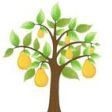




.thumb.jpg.59eed8b93aa1c92d8b306f10811981dc.jpg)
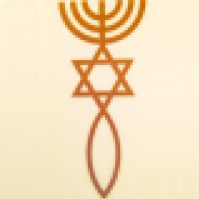

.thumb.jpg.b2b18dee95d255bc72964a48a43db3b8.jpg)
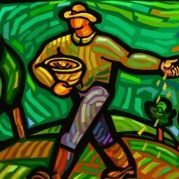



.thumb.jpg.78a316778a2b75f1377c52957d74a45f.jpg)


.thumb.jpg.1337640fd1be4d98e0f4fddc4cf5453f.jpg)

